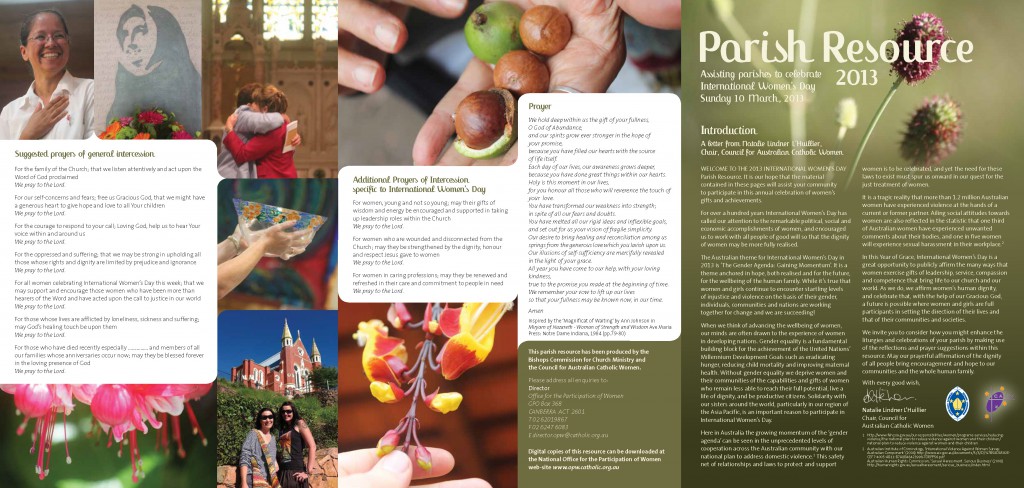
‘Our Father’ might not be the best way to think of God, according to a document released last week by the Office for the Participation of Women (OPW), an official body of the Australian Catholic Bishops Conference (ACBC).
The suggestion is contained in the OPW’s Parish Resource 2013, a document that was designed to help parishes celebrate International Women’s Day on Sunday, March 10.
The document also suggests the role of ‘mother’ may have been deliberately excluded from the parable pf the Prodigal Son, found in the Gospel of Luke (15: 1-3, 11-32).
“Today, it is timely to ask, ‘Where was the mother of the two sons?’,” the document states.
“Was the father widowed? Or was the mother still part of the family but simply written out of the story, in the way that many women’s roles and contributions were not included in Scripture?”
The Gospel writer Luke had been praised for his inclusion of women in the past, the document states, but Scripture scholars were now saying he had trivialised their tasks and roles.
“On International Women’s Day, when we encounter a story where the only women mentioned [in the parable of the prodigal son] is a reference to prostitutes (Luke 15:30), it is timely to stop and think about the many roles that women have in our world, and how many of those roles are a result of personal choice or sociocultural circumstances.”
“What would our world look like if women everywhere did have personal choice over how they used their gifts and talents?” the document asks.
Using the parable to depict God’s fatherhood might preclude people who did not having loving relationships with their own earthly fathers from relating to God.
“Let us keep in mind that the Catechism of the Catholic Church (#370) states: “In no way is God in man’s image. He is neither man nor woman. God is pure spirit in which there is no place for the difference between the sexes.”
“In his Angelus address on September 10, 1978, Pope John Paul II said, ‘God is our father; even more, he is our mother.’
A letter written by the Chair of the Council for Australian Catholic Women, Natalie L’Hullier is contained in the document: “The growing momentum of the ‘gender agenda’, [this year’s theme] can be seen in the ‘unprecedented levels of cooperation across the Australian community’ around a national plan to address domestic violence.
“It is a tragic reality that more than 1.2 million Australian women have experienced violence at the hands of a current or former partner,” Ms L’Hullier wrote, citing statistics from the Australian Institute of Criminology.
“Ailing social attitudes towards women are also reflected in the statistic that one third of Australian women have experienced unwanted comments about their bodies, and one in five women will experience sexual harassment in their workplace.”
The OPW’s Parish Resource 2013 was heralded to the wider Church in an ACBC media release on March 7.
Women made up 61 per cent of parishioners and 90 per cent of pastoral associates, the media release stated, with religious sisters making up around half of those associates.
OPW Director Donella Johnston said it was important the contribution of women within the Catholic Church was acknowledged and celebrated.
“It is imperative that the voices of women are heard and that their gifts are given the opportunity to flourish in all aspects of Church life,” Ms Johnston said, “including involvement in decision-making processes and leadership”.
The OPW was established by the ACBC in 2000 and works closely with the Council for Australian Catholic Women – an advisory body to the ACBC made up of women and men; lay, clerical and religious.
The OPW’s mandate and activities are listed on their website – www.opw.catholic.org.au.
The website regularly features stories on ‘Inspirational Women’, including recently-featured Spanish artist Yolanda Dominquez, whose 2011 ‘Poses’ installation received national and international media attention.
Her other ‘livings’ include Virgins to be returned conducted in 2009, in which nativity statues of the Virgin Mary were collected and sent ‘back’ to the Vatican, symbolising, according to the artist’s website, the ‘returning’ of concepts which had been ‘imposed on women’.
Other ‘Inspirational Women’ profiles may be viewed at: www.opw.catholic.org.au.